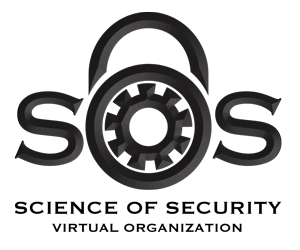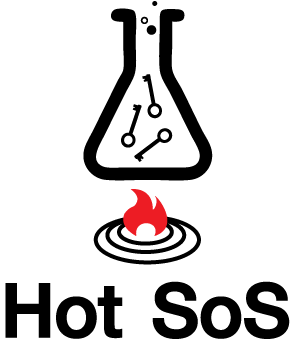Hot SoS is a research event centered on the Science of Security.
The key motivation behind developing a Science of Security is to address in a principled manner the fundamental problems of security.
Security has been intensively studied, but a lot of previous research emphasizes the engineering of specific solutions without first developing the scientific understanding of the problem domain. All too often, security research conveys the flavor of identifying specific threats and removing them in an apparently ad hoc manner.
The motivation behind the nascent Science of Security is to understand how computing systems are architected, built, used, and maintained with a view to understanding and addressing security challenges systematically across their life cycle. In particular, two features distinguish the Science of Security from previous research programs on security.
- Scope. The Science of Security considers not just computational artifacts but incorporates the human, social, and organizational aspects of computing within its purview.
- Approach. The Science of Security takes a decidedly scientific approach, based on the understanding of empirical evaluation and theoretical foundations as developed in the natural and social sciences, but adapted as appropriate for the artificial science (in Herb Simon's term) that is computing.
Following a successful invitational SoS Community Meeting in December 2012, Hot SoS 2014 will be the first open research event in what is expected to be a continuing series of such events.
Symposium proceedings will be indexed in the IEEE digital library.
Topics

We welcome submissions on all topics relevant to the theme of Science of Security including, but not limited to, the following (each from the perspective of the Science of Security):
- Computing architectures
- Networks
- Software engineering practices
- Models of human interaction and behavior
- Organizational models
- Evaluation methodologies
Additional information about the Science of Security can be found at the Science of Security Virtual Organization.
If you have any questions about the topics or submission instructions, please feel free to contact the Program Chairs, Professors David M. Nicol and Munindar P. Singh, at hotsos14@gmail.com
Emphasis on Science: Required Section in Each Submission
The key motivation behind Hot SoS is to bring out and promote the science underlying security. Therefore, we require that each submission include a section called "The Science" in which the authors should describe in what ways their contribution constitutes science. We interpret science in the broadest sense of the systematization of knowledge to uncover foundational principles through theory-driven inquiry. Thus methods reminiscent of the natural, life, social, or behavioral sciences are all acceptable. Our motivation behind asking for this section is not to impose any ideology on researchers but to give a spotlight to and thus promote the science of security.
Important Dates
Abstracts: November 8, 2013 December 4, 2013 January 3, 2014
Submissions: November 15, 2013 December 11, 2013 January 6, 2013
First round of reviews: January 10, 2014 February 17, 2014
Author responses: January 15, 2014 February 20, 2014
Decisions: February 1, 2014 February 28, 2014
Final versions of accepted submissions: March 1, 2014 March 21, 2014
Poster Submission: March 14, 2014 March 21, 2014
Symposium and Bootcamp: April 8-9, 2014
Submission Instructions
Paper Submission
Submissions must be formatted in the IEEE Conference Style and be no more than 10 pages not including bibliography and appendices, and no more than 12 pages total. We recommend the IEEE LaTeX package, IEEETran, to be used with the following options: \documentclass[10pt, conference]{IEEEtran}
Submissions must be prepared for double-blind review, that is, omit the authors names as well as any explicit indicators of the authors' identities such as referring to a past publication as "our work" or "we showed".
Submit your manuscript using Easy Chair from here.
Submissions must not be previously published or accepted for publication and must not be submitted for publication elsewhere between the Hot SoS submission and decision dates. Prior or concurrent submission to workshops without a proceedings might be acceptable, if disclosed at the time of submission.
Poster Submission
HotSoS is soliciting 2-page poster abstracts that will be archived in the proceedings. Submissions must be formated in the ACM Sig Alternate style, and no more than 2 pages in total (including references).
Submit your 2-page abstract using Easy Chair from here.
Organization
Organizing Committee
General Chair: Laurie A. Williams, North Carolina State University
Program Co-Chair: David M. Nicol, University of Illinois, Urbana-Champaign
Program Co-Chair: Munindar P. Singh, North Carolina State University
Web Chair: William Enck, North Carolina State University
Publicity Chair: Travis Breaux, Carnegie Mellon
Finance Chair: Lucas Layman, Fraunhofer Institute
Proceedings Chair: Nirav Ajmeri, North Carolina State University
Local Arrangements: David Wright, North Carolina State University
NSA Liaison: Heather Lucas
Technical Program Committee
Gul Agha, University of Illinois
Ehab Al-Shaer, University of North Carolina, Charlotte
Bo An, Nanyang Technological University
Travis Breaux, Carnegie Mellon University
Jean Camp, Indiana University
Amit Chopra, Lancaster University
Jedidiah Crandall, University of New Mexico
Fabiano Dalpiaz, Utrecht University
Anupam Datta, Carnegie Mellon University
Scott DeLoach, Kansas State University
Will Enck, North Carolina State University
Rino Falcone, ISTC-CNR
David Garlan, Carnegie Mellon University
Dieter Gollmann, TU Hamburg-Harburg
Mark Greaves, Pacific Northwest National Laboratory
Xiaohui Gu, North Carolina State University
Somesh Jha, University of Wisconsin
Christopher Kiekintveld, University of Texas at El Paso
Karl Levitt, UC Davis
Ninghui Li, Purdue University
Emil Lupu, Imperial College
William Martin, U.S. Department of Defense
Christopher Mayhorn, North Carolina State University
Ian Molloy, IBM Research
Emerson Murphy-Hill, North Carolina State University
Tim Norman, University of Aberdeen
Nir Oren, University of Aberdeen
Simon Parsons, University of Liverpool
Wolter Pieters, Delft University of Technology
Robert Proctor, Purdue University
Angela Sasse, University College London
Greg Shannon, CERT
Kevin Sullivan, University of Virginia
Wamberto Vasconcelos, University of Aberdeen
Serena Villata, INRIA Sophia Antipolis
Claire Vishik, Intel
Tara Whalen, Carleton University
Rebecca Wright, Rutgers University
Sponsors and Cooperation
Sponsors
- National Security Agency
- Army Research Office
- National Science Foundation
In-Cooperation
- ACM
